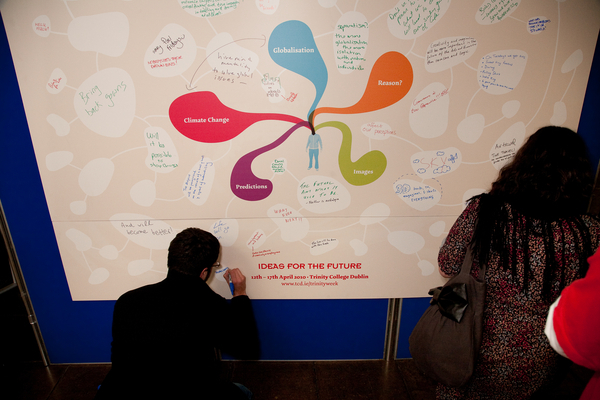Trinity Week Academic Symposium ”20/20 Vision’: What will the world be like in ten years time?’
Posted on: 15 April 2010
As part of the celebrations for Trinity Week 2010 the Trinity Academic Symposium took place on Wednesday, April 14th last. The symposium titled 20/20 Vision: What will the world be like in ten years time? and moderated by RTÉ Morning Ireland presenter, Áine Lawlor, looked forward to the likely state of the world in 2020. International experts speaking at the event included, Stephen King, Group Chief Economist at HSBC Bank, who talked about the impact of emerging nations on western economic prosperity, and suggested that the coming decades would see a major redistribution of global wealth and power that would force consumers in the United States and Europe to stop living beyond their means. Unless things change drastically, King argued, the increasing power of emerging markets, when coupled with poor internal regulation and an increasingly anachronistic system of global governance, would result in greater instability and income inequality. The social and political consequences would be alarming for citizens of western countries who have become accustomed to living in prosperity.
The HSBC economist’s talk was followed by Howard Friel, author of The Lomborg Deception: Setting The Record Straight About Global Warming, which is a vigorous defence of the science behind models of man-made climate change. His topic at the symposium was Global Warming in 2020: Climate Denial vs. Climate Action – Two Scenarios. He argued for the power of reason, rationality and evidence-based research to undermine tendentious arguments against man-made climate change based on a strange coalition of ‘junk science’ and vested political and business interests.

Visitors brain storm ideas about the key issues raised during the Trinity Week Academic Symposium.
The symposium concluded with a talk by, Nicholas Mirzoeff who is one of the leading figures in the interdisciplinary field of visual culture. In his presentation on Image Worlds: Counterinsurgency, Crisis, Climate Change he explored the likely effects of a profound cultural shift over the next decade away from the printed word towards the visual image. How would this change impact upon the ways in which we organise our societies and our economies, as well as our personal and private lives? Would this visual culture enable us to see complex problems more clearly than before, or would it function as an opiate to distract us from the most pressing issues facing the planet?
Taken together, these presentations sketched some of the most pressing problems facing society over the coming decade, and the ways in which humankind could employ reason, evidence and critical thought to surmount these challenges.
